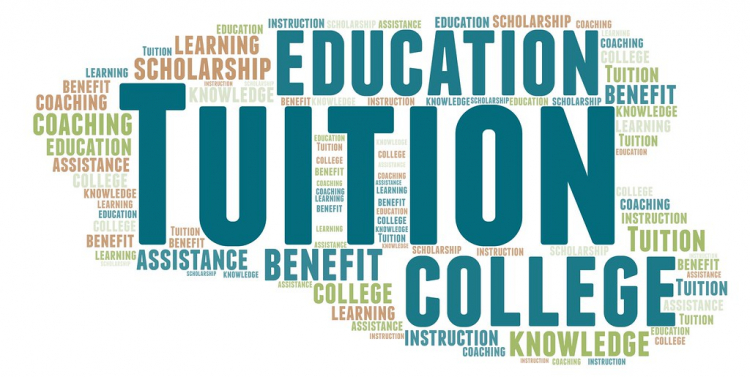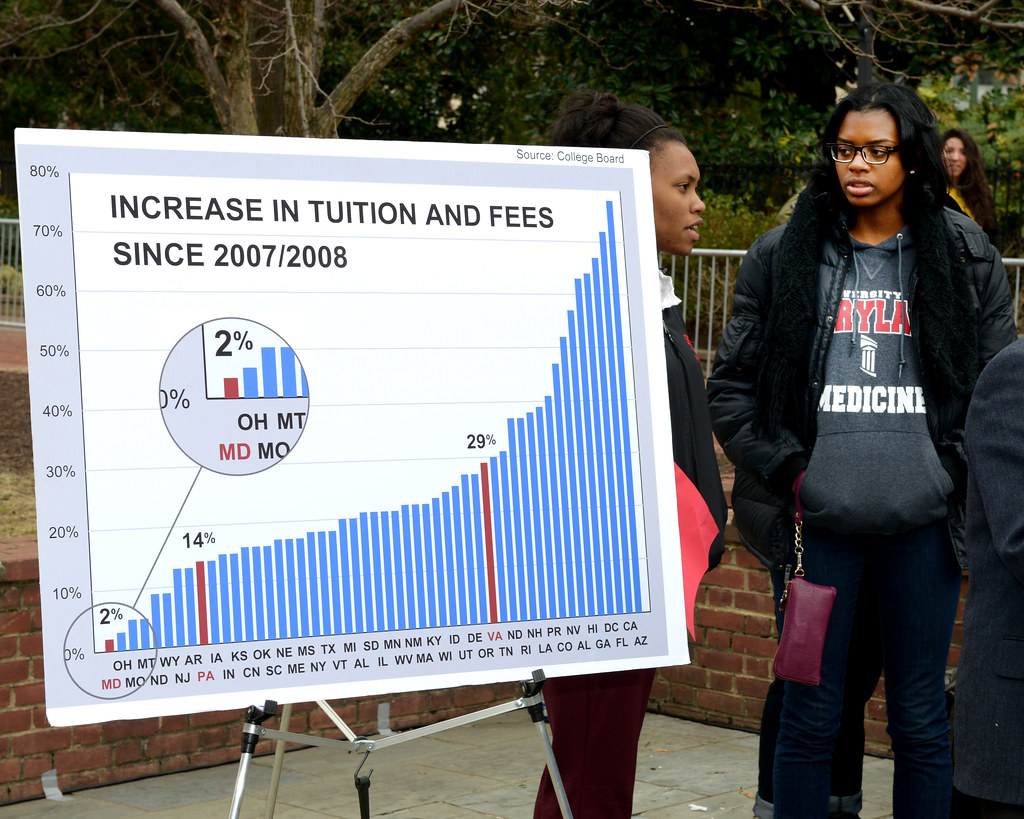Should Online Tuition be Reduced?

Let's imagine that there is a student named Hesitant. Hesitant is just about to graduate from high school and they need to take steps to further their education. Hesitant's community emphasizes the importance of a degree as it provides financial security, even though the ridiculously high college tuition costs make everyone question their financial stability. Nevertheless, Hesitant decides to take out a loan and pursue their bachelor's degree. But then, something terrible happens, and COVID-19 shuts down the entire world. More and more schools switch to online education and Hesitant starts wondering whether they need to pay the same amount of money for the different forms of education and experience. After all, they had been promised all sorts of college experiences, like extracurricular activities, social life, and hands-on learning. So is online education worth the money?
"Why am I here?" asks Noelle Trotter, a sophomore at AUP who experienced the same situation, like countless other students around the globe. Mundane life in front of a computer with no human interaction is the only thing that is left. So why should students pay such a high price for groundhog days? Over 93% of U.S. college students demand a reduction in tuition cost because they feel the quality of education isn't the same. But teachers disagree, claiming that the learning quality is still the same and schools do everything they can to make students' experience bearable. So who is right, teachers or students?
Students and teachers experience the, "new normal," in very different ways. For Maria Bach, Assistant Professor in the Department of Economics and Management at AUP, the experience has not been satisfying because she feels like she has lost connection with students. "It is not the same as it used to be. It is challenging to teach students for several reasons. Their cameras are off, which makes me feel awkward and makes it difficult to gauge whether students are following my lecture, and sometimes it just seems like I am speaking into a void," Professor Bach says. But encouraging students to turn cameras on isn't the biggest challenge. "It is also more difficult for students to pay attention online. I also worry that students cheat when they can easily look at their notes or consult the internet during my closed book exams," says Professor Bach.
In 2019, 60% of professors admit that academic dishonesty is likely to occur when learning online. Professor Bach also admits that it is more difficult to test students' knowledge without them feeling like she is, "picking on them," but professors haven't found any better way to check whether a student did the homework. But for Professor Brian Schiff in The Department of Psychology at the AUP, the online experience cannot be described in terms as simple as positive or negative. "It is not a value judgment. We did not have a choice, and we needed to adjust. It was a necessity," he says.
Both Professors Bach and Schiff admit that they have put in twice as much work when they switched to Emergency Remote Teaching than they did before. They had to prepare new plans in two days, change the form of tests, adjust course material, and implement new ways of learning. Since education goes back and forth from hybrid to online, teachers have to adjust newly created plans to an even newer version constantly.
And yet for students, many feel they have to overcome even larger hurdles. Many say it is really hard to stay focused during classes, especially when it isn't required to keep cameras on. "As much as I do not like to turn my camera on, I feel like I am more present when I have it on. It gives me a sense of accountability," says Trotter. And yet, most of her classes don't require an active camera. 48.6% out of 109 students admit that they cannot concentrate during physical classes, so you can only imagine the percentage of "zoned out" students during online classes especially if cameras are off.
Because of this, Trotter feels the online education experience has not the best, to say the least. "I feel very disconnected from teachers and the connection is a necessity," she says. When she first arrived at AUP, she didn't know what degree or passion she wanted to pursue. Like many other college students, she was constantly questioning whether education was something she really needed in a world that gave experience without taking thousands in debt. "All these thoughts fade when you get social interaction, the opportunity to join clubs, communicate with teachers. But then online education takes all of it away from you, and you become even more skeptical of education than you were in the beginning," Trotter says.
Similarly, Ethan Dondonan, a sophomore at AUP, admits that his experience has mostly been negative due to a lack of social interaction and differences in time zones. But interestingly, he still feels like the quality of education and his grasp of material has not declined because he still gets to interact with faculty members at AUP virtually.
Image credit: Creative Commons/MDGovPicsWhen thinking overall, nothing has changed for students' quality of education. They still have a chance to get the same education, though they are not able to experience all stereotypical college experiences. But when you think about it, students attend university solely to get an education and that's what universities are trying to provide despite the circumstances. This has been said to not undermine on-site experience, but rather to emphasize that online experience can give you just as much. So if everything stays the same, why should the tuition cost be lowered? 95% of AUP's revenue, for example, is from tuition costs so the reduction of cost for online education might simply mean the end for many private institutions, including AUP. The global economic crisis might suggest that online education should be cheaper, but the reduction of tuition cost might mean the dismissal of faculty members.
An important point was brought by Professor Jonathan Zimmerman of the University of Pennsylvania, regarding the quality of online education. “I don't think we know enough about how much students were learning under the face-to-face model to calculate what an alleged loss might be under this new model,” Zimmerman says. So, it is simply impossible to see what students really are missing when it comes to comparison between online and in-class education. Many students have filed a petition to ask for a refund or cost reduction, but would it be too erratic to suggest that students are using online education as an excuse to demand a reduction from a very high price in the first place?
Zimmerman has also suggested that universities used online education to attract new students in the past. Online education went from privilege to disadvantage, but is it worth a cost reduction? Most community colleges have been teaching most classes online even before the pandemic, but it has always been different for most private and elite institutions. Most petitions to reduce the price for online education come from elite institutions, which might simply mean that the demand and petitions are not really about discontent with online education. It's about a high price tag. "It has become not about how much university really costs, but rather about how much it is worth," says Professor Bach.
Image credit: Unsplash/Nathan DumlaoTo be, or not to be, that is the question. It is still unclear for students whether online education should be cheaper or not. On one hand, they understand the teachers' perspective. They put in twice as much work, they also have to adjust, and they are "giving" and not always "receiving". And many students never question if their teachers' compensation is proportional to the work they do for online classes.
On the other hand, there are students who have to take out massive loans for an unsatisfactory experience. Nevertheless, if there would be a cost reduction, it would mean an end for some universities. In a less tragic, but still traumatic case, it would mean the loss of jobs from less protected strata of society. "Nothing is free, and every discount has to be compensated with something else,” Professor Zimmerman says. “So how should universities compensate? I hope not by firing a sanitation worker or a cafeteria worker."
Professor Schiff points out eloquently, "It is important to realize that all of us are human beings and we all have problems. Students have problems, universities have problems. We all need to try to be more responsive toward each other's needs and situations." It is also undeniable that even with education online, earning a college diploma still holds prestigious value and students can still expand their knowledge. The reduction of college tuition is ultimately left up to each to decide, a decision many students may not welcome.









